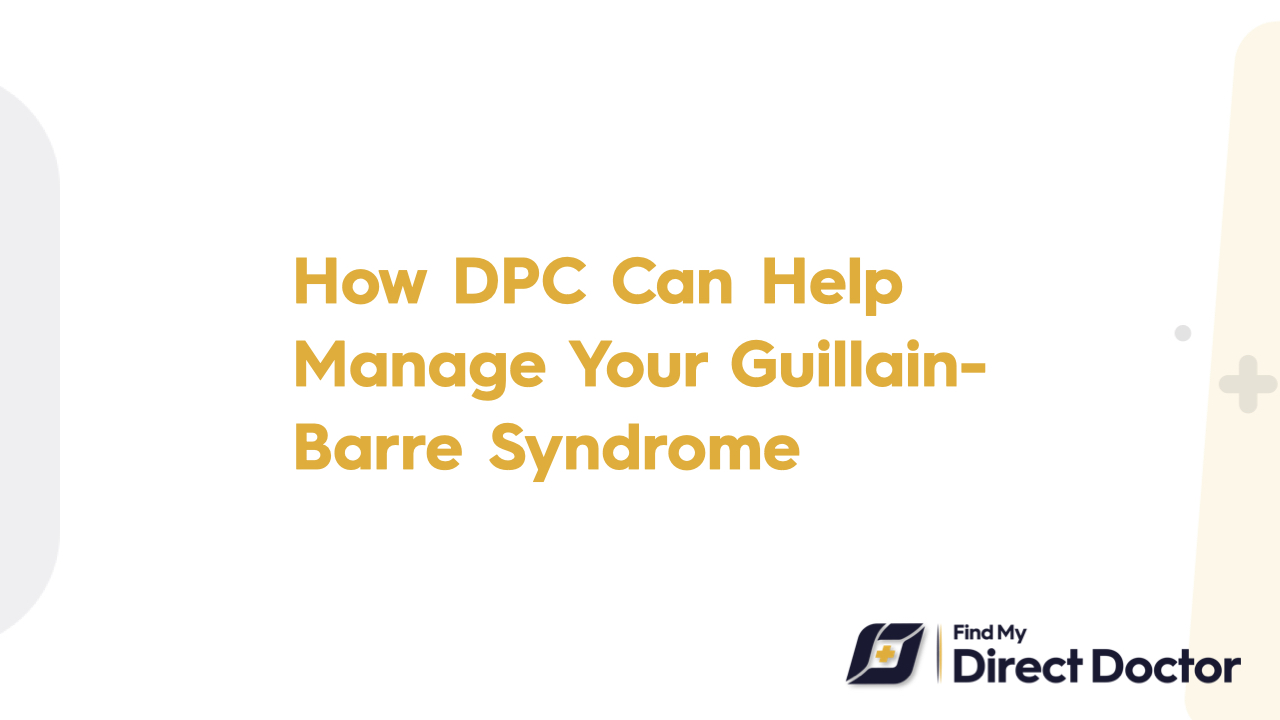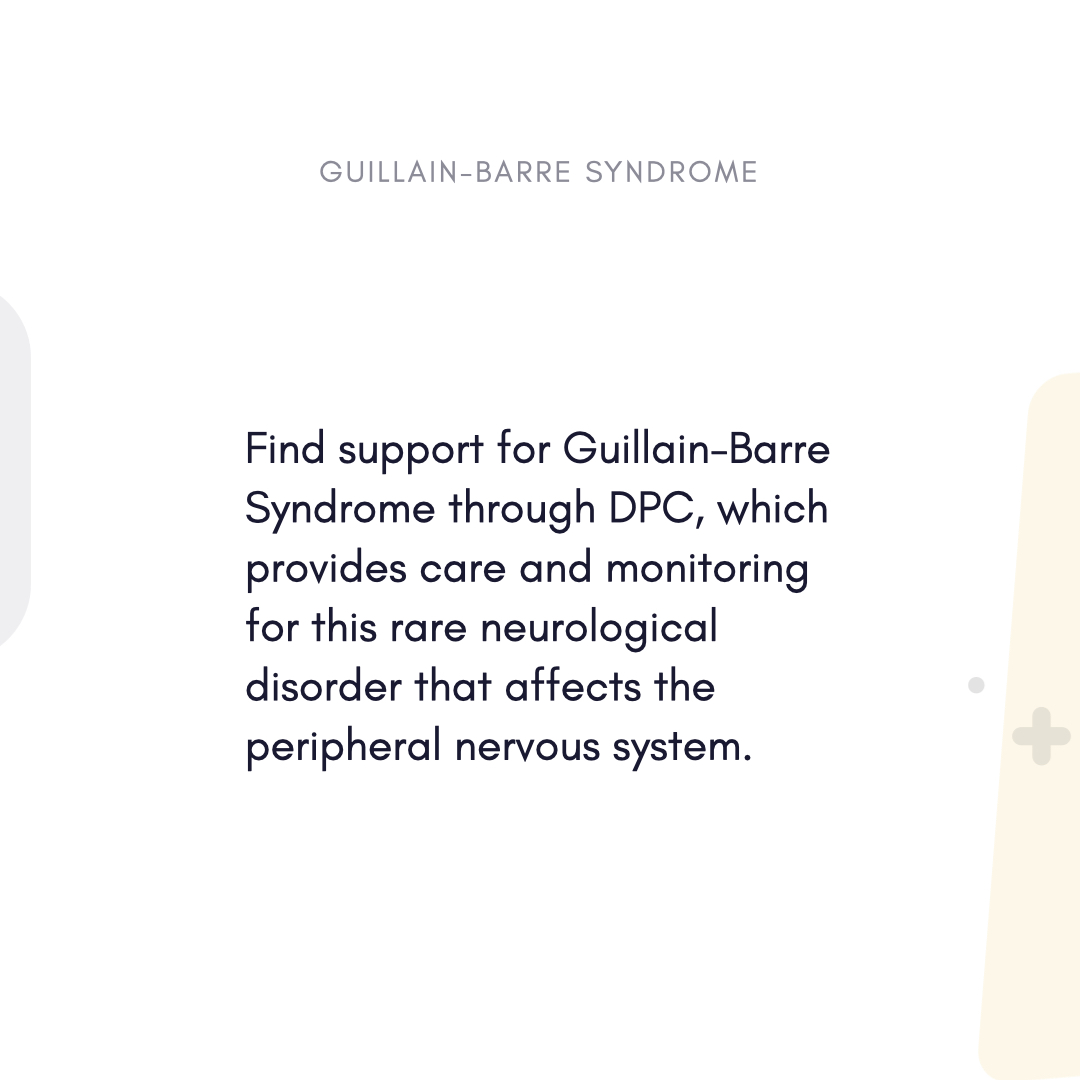Guillain-Barré Syndrome (GBS) and Direct Primary Care (DPC): A Roadmap to Recovery
Rare autoimmune disease Guillain-Barré Syndrome (GBS) causes fast muscle weakness, paralysis, and, in severe cases, respiratory failure by means of an immune system attack on peripheral nerves. Managing GBS calls both for acute intervention and long-term rehabilitation as well as constant observation. A membership-based model with flat monthly rates, Direct Primary Care (DPC) offers patient-centered care that fills in gaps in conventional healthcare by guaranteeing timely coordination, customized rehabilitation, and holistic support.

Knowing Guillain-Barré Syndrome
- Causes: Often post-infection (e.g., Campylobacter, the Zika virus) or surgery.
- Symptoms include:
- Early: Ascending muscular weakness, tingling in extremities.
- Progressive: Paralysis, dyspnea, autonomic dysfunction—that is, blood pressure instability.
- Diagnosis:
- Clinical assessment, lumbar puncture (elevated CSF protein), nerve conduction tests.
- Treatment:
- IV immunoglobulin (IVIG), plasma exchange, respiratory support—acute phase.
- Rehabilitation calls for psychological support, pain management, physical/occupational therapy.
How DPC Improves GBS Management
How DPC Improves GBS Management
- Acute Phase Coordination:
- Quick triage: Using telehealth, identify early symptoms—such as tingling or weakness—then fast-forward referrals to neurology or ERs.
- Working with inpatient teams, ensure timely IVIG/plasma exchange and track post-discharge needs.
- Customized Recovery:
- Customized treatment plans: Work with physiotherapists to create progressive strength-building activities, so preventing overuse.
- Prescribe gabapentin or duloxetine for neuropathic pain; vary dosages to minimize side effects.
- Avoiding Complications:
- Home spirometry can help identify early breathing declines.
- Management of blood pressure fluctuations or arrhythmias with drugs and lifestyle changes helps with autonomonomic dysfunction.
Key DPC Benefits for GBS Patients
- Unbroken Availability:
- 24/7 support: Quick telehealth visits for abrupt symptom changes (such as trouble breathing or swallowing).
- Simplify interactions among neurologists, rehabilitation teams, and mental health professionals to ensure seamless specialist coordination.
- Patient-Centered Approach:
- Extended visits: Without time limits, handle social, emotional, and physical issues including anxiety, financial stress.
- Customized recovery plans: Change the intensity of rehabilitation depending on degree of tiredness and mobility improvement.
- Savings and Cost Transparency:
- Flat monthly fees (USD 100–200): Cover basic medications, frequent follow-ups, care coordination.
- By means of proactive monitoring of recovery milestones, lower hospital readmission rates.
- Reduced Administrative Load:
- Cut down prior authorizations for referrals or treatments to speed important interventions.
- Simplified care: Emphasize patient needs above documentation to guarantee thorough attention to change in symptoms.
DPC Personalized GBS Management
- Advocacy in Acute Phase:
- IVIG or Plasma Exchange Follow-Up: Track side effects—such as kidney strain or headaches—with post-treatment labs.
- Coordinating home health: Set up nursing for catheter management, wound care, or mobility aids.
- Rehabilitation & Long-Term Support:
- Vitamins (B12, D) to help nerve repair and high-protein diets.
- For PTSD or depression, link patients to GBS support groups or counseling.
- Preventive Action Plans:
- Advice on safe vaccinations—that is, avoiding flu shots during early recovery—should be given.
- In chronic cases, keep an eye on residual weakness or relapse risk through annual nerve studies.
Real-World Success Story
- Anna's DPC provider coordinated emergency IVIG and ICU transfer during acute paralysis following development of GBS after a gastrointestinal illness.
- For home-based rehabilitation, teamed with a physiotherapist, weekly adjustments in exercises.
- Prescribed nortriptyline for nerve pain, then linked her to a network of GBS survivors.
- In eighteen months, Anna recovered ninety percent of her mobility and started working part-time.
Frequently Asked Questions About GBS and DPC
- Q: Is DPC able to control GBS respiratory failure?
- A: DPC coordinates post-ICU treatment (e.g., home oxygen, pulmonary rehab) while triaging crises to hospitals.
- Q: Does DPC cover IVIG/plasma exchange?
- A: DPC manages pre-authorization and follow-up care; these hospital-administered treatments are billed separately.
- Q: How does DPC treat post-GBS tiredness?
- A: Tailor activity pacing, sleep hygiene practices, and screen for underlying problems (such as thyroid dysfunction).
- Q: Can DPC help with disability paperwork?
- A: Definitely. For insurance claims or workplace accommodations, DPC providers assist in documenting advancement.
How DPC Specifically Helps GBS Recovery
- Early Intervention: Fast response to first symptoms helps to lower paralysis risks.
- Holistic Support: Approach physical therapy, mental health, and social issues together.
- Transparent Pricing: Helps free up money for therapies or medical equipment.
- Advocacy: Guide patients through complicated care systems such that they concentrate on recovery.
Take Control of Your GBS Journey
Although GBS recovery is a marathon, you are not alone running it. DPC helps you find a partner that values continuity, accessibility, and personalization—qualities essential to regaining freedom and quality of life. All set to confidently manage GBS? Search for a DPC provider nearby and enjoy proactive care as discreet as it is.






